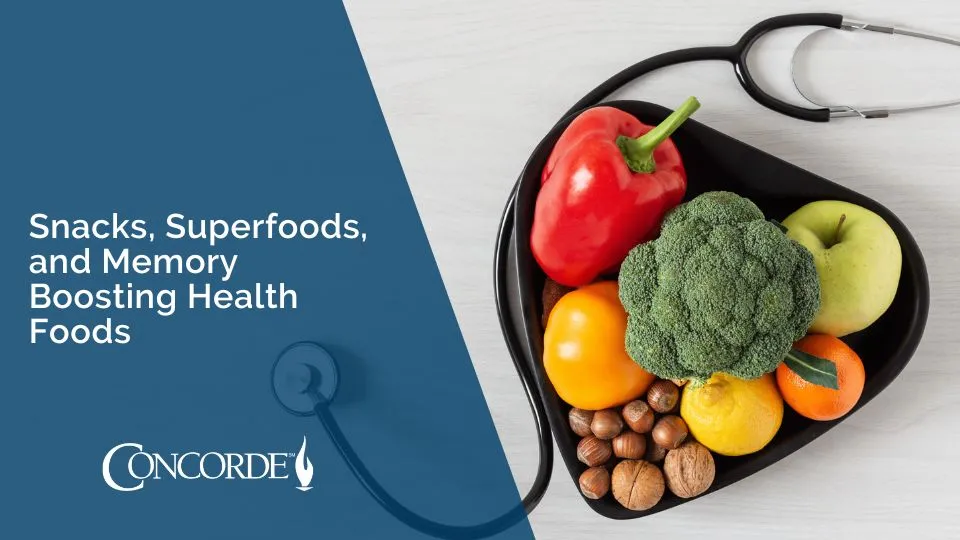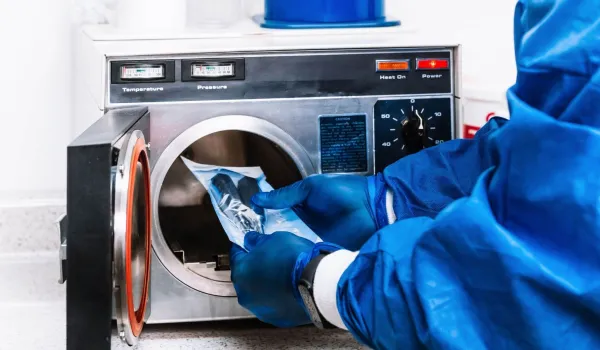
The food we eat can directly impact the way our bodies perform. As a health care degree-seeking student, it is important to fill your body with foods that fuel your brain, as well as your overall well-being.
As you gear up for your exams, quizzes, and daily assignments, we have compiled a list of some superfoods to help you study.
Healthy Snacks to Help Fuel You
Balancing your family, household obligations and health care schooling may make it feel like you don't have time to come up nutritious snacks.
The good news is that healthy snacks with high nutritional value can also be easy to prepare. If you buy in bulk, spend just a bit of time on prep, and add a dash of creativity to the mix, you can cover a whole week's worth of snacks in just an afternoon.
Peanut Butter "Dip"
Many people avoid eating veggies if they're not covered in salad dressing or baked into an entree. However, snacks are a great way to get both healthy raw veggies and plenty of protein into your diet.
Measure out a single serving of peanut butter (2 tablespoons) and eat it along with some raw carrots and raw celery. It's a great - and delicious - energy boost for any time of the day.
Ham Sticks
Thinly sliced deli meat like ham can be great when combined with either jicama or celery. Wrap several sticks in thin slices of ham for a nutritious and yummy fast snack. If you want an extra flavor kick, use a dollop of brown mustard as a dip.
Trail Mix
While you can make your own trail mix, that might be a bit more labor-intensive than you can manage right now.
Buy a prepared trail mix without sugar added. Look for ingredients like unsalted nuts, granola, and unsweetened dried fruit. Trail mix is super versatile as a healthy snack because you can stash it in your backpack or bag to bring along to school or any other place.
You can pre-package servings of the trail mix in zipper baggies, so there's no chance of overindulging.
Eggs
Hardboiled eggs are a great nutritious snack for any time of the day. Opt for small size eggs and boil half a dozen (or more, depending on your family's needs!) at a time.
They'll store in the fridge for a few days with no problems. You can easily shell an egg or two when the need to snack arises. It gives you protein to power through your day!
Hummus to Go
While you can buy pre-made hummus snack kits, you can also assemble your own hummus snacks at home in only a few minutes. Start with a mason jar, no more than 1/3 cup hummus, and some pre-cut carrots and celery sticks.
Place the hummus at the bottom of the jar and then stick your veggies into the hummus, standing up. Screw the lid onto the jar and you're done! Just make sure to keep the jar vertical to avoid the hummus spreading.
Superfoods to Kick Start Your Day
Nuts and Berries
Tufts University conducted a study that showed that blueberries can aid in delaying or improving short-term memory loss. Toss them in pancakes, smoothies or a salad and ensure that you have added protection. You might also want to add a few pumpkin seeds or walnuts to the mix. Walnuts allow for better flow of oxygen to the brain, while zinc-laden pumpkin seeds enhance memory and thinking skills.
Fruits and Vegetables
When your mother tells you to eat your vegetables, you should listen!
Not only are they full of useful vitamins and nutrients, but they are also great superfoods to aid you in obtaining your health care degree. When you are looking through graphs, charts and lab materials, tomatoes can be the key to better eye health. They contain lycopene, which is an antioxidant that is great for reducing stress, headaches and improving vision.
In the same way, three powerful green vegetables that can help with your health care degree are broccoli, spinach, and avocados. Broccoli enhances cognitive function by being an excellent source of Vitamin K. Avocados are full of fat - the good monounsaturated kind- that lower bad cholesterol and enhance blood flow. Spinach, on the other hand, is not just a source of physical strength but can help protect against cognitive decline.
Fish
There have been countless studies and articles written about the power of Omega 3 - fats and their relation to memory. Therefore, it should not be hard to conceive that those seeking a health care degree might want to add fatty fish to their diets. Sardines are a great snack that can help with memory and focus. Also, try adding some salmon, trout or mackerel to your lunch or dinner to not only boost brain function but heart function as well.
Eggs
Eggs, as mentions earlier, are a very versatile snack for busy students seeking a health care degree. You can boil them, bake them, and fry them and still capture all of their needed protein. Eggs also contain choline which assists in producing neurotransmitters in the brain. These neurotransmitters help regulate your memory, mood, and behavior.
Sweet Potato
Another tasty and versatile superfood is the sweet potato. It is a good carbohydrate that is rich in vitamins and antioxidants. Try pairing sweet potatoes with eggs for breakfast, baking it for lunch, or making sweet potato chips for a snack.
Coffee and Chocolate
Coffee, water, and chocolate round out our other superfood selections. There is research that shows that both coffee and dark chocolate improve mental sharpness. Also, dark chocolate is also shown to improve blood flow (are you sensing a theme yet).
Strengthen Recall by Adding These Foods to Your Diet
Did you know that what you eat also can affect memory and brain function? Good blood flow to the brain positively impacts memory, so foods that nourish the heart are a good choice. Research has shown that the Mediterranean Diet helps keep brains sharp. Foods like those in that diet also help with better cognitive function.
EatRight.com recently published an article listing four types of foods to help boost your memory and increase health care awareness...
Eat Your Vegetables
Getting adequate veggies, especially cruciferous ones like broccoli, cabbage, and dark leafy greens might help improve memory. Try a kale salad or substitute collard greens for a tortilla in your next sandwich wrap. Broccoli stir fry is also an excellent option for lunch or dinner.
Be Sweet on Berries and Cherries
Berries - especially dark ones such as blackberries, blueberries, and cherries - are a rich source of anthocyanins and other flavonoids that might boost memory function.
Get Adequate Omega-3 Fatty Acids
Omega-3 fatty acids, docosahexaenoic acid (DHA) in particular, might help improve memory in healthy young adults. Seafood, algae and fatty fish - including salmon, bluefin tuna, sardines, and herring - are some of the best sources of omega-3 fatty acids. Substitute fish for meat a couple of times each week to get a healthy dose. You also can get omega-3 fatty acids from fish oil, seaweed or microalgae supplements.
Work in Walnuts
Walnuts, well known for their positive impact on heart health, might also improve memory. Snack on a handful of walnuts to satisfy midday hunger, add them to oatmeal or salad for crunch or mix them into a vegetable stir-fry for extra protein.
At Concorde Career Colleges, we love to help our students achieve and succeed in their health care training program. Use the tips above to help you balance your busy life with good nutrition!
Take The Next Step Towards a Brighter Future
We have a Concorde representative ready to talk about what matters most to you. Get answers about start dates, curriculum, financial aid, scholarships and more!




